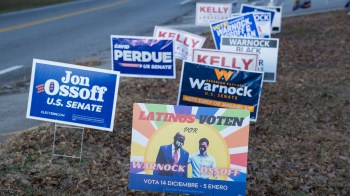David Brancaccio: European finance ministers are meeting today about how much money banks should have around in case of emergency. Banks argue the more that’s set aside the less they have to lend and invest. The United States has agreed to new rules about this but banks continue to push back.
Marketplace’s Stephen Beard joins us live from London with more on this. Good morning, Stephen.
Stephen Beard: Hello David.
Brancaccio: Well, making banks keep extra cash in their accounts as a kind of safety net — because, right, if they don’t, sometimes the government is asked to come in with a bailout?
Beard: Absolutely, yes. But this is really the collision between two opposing ideas. On the one hand, as you say, you’ve got those who say that it’s vital that you tighten up the rules to make sure the banks have got enough money in reserve to prevent another Lehman-style collapse.
But on the other hand, you have those who say if you increase bank reserves, banks will lend less money to businesses and households. That will deprive the global economy of around $1 trillion worth of credit a year, and that could be disastrous when parts of the global economy — especially Europe — are so fragile.
Brancaccio: How does this play out in Europe, where we know that banks and governments are already having “financial issues?”
Beard: Indeed. Today’s meeting is about whether the European Union should implement the new global rules by the beginning of next year. Now the Germans and the U.K. in particular argue that bank safety is paramount and the new tougher rules should be introduced before the end of this year.
But finance ministers from weaker economies — like those of Italy and Spain — are not so keen, as Ralph Silva of the SRN consulting firm points out.
Ralph Silva: The ministers are saying instead of doing it this year — because they don’t want to reduce that amount of money in the marketplace — they are suggesting moving it a year forward, or maybe even farther, until the economy has had a chance to recover.
And some of these countries certainly need to recover — like Spain, which is back in recession.
Brancaccio: So which way are these meetings going to go today Stephen?
Beard: Well, they don’t absolutely have to decide today, so you know what? They probably won’t. They’ll probably “kick the can down the road.”
Brancaccio: Ah the kick the can metaphor. Thank you, Marketplace’s Stephen Beard in London. I appreciate it.
Beard: OK David.
There’s a lot happening in the world. Through it all, Marketplace is here for you.
You rely on Marketplace to break down the world’s events and tell you how it affects you in a fact-based, approachable way. We rely on your financial support to keep making that possible.
Your donation today powers the independent journalism that you rely on. For just $5/month, you can help sustain Marketplace so we can keep reporting on the things that matter to you.


















